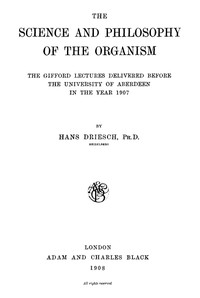The Science and Philosophy of the Organism by Hans Driesch
"The Science and Philosophy of the Organism" by Hans Driesch is a scientific publication written in the early 20th century. The work encompasses a systematic exploration of biological topics relevant to the philosophy of nature, positioning Driesch as a vital contributor to the discourse on organismal biology. The author aims to establish a definitive framework regarding vitalism, the characteristics of biological systems, and the developmental processes of organisms, particularly focusing on how
these elements relate to broader philosophical inquiries. The beginning of the book introduces Driesch's motivations and context for delivering the Gifford Lectures at the University of Aberdeen. He outlines his intent to engage with biological phenomena in a way that transcends mere empirical observation, leading into a philosophy that examines natural processes. He emphasizes the importance of understanding the interactive dynamics between scientific discoveries and their philosophical implications, particularly in relation to development and the essence of life itself. The opening portion sets the stage for a thorough investigation into both empirical and theoretical aspects of biology, using specific case studies from embryology, notably that of sea-urchins, providing a rich foundation for future discussions on the organism's nature. (This is an automatically generated summary.)
Read or download for free
| How to read | Url | Size | |||
|---|---|---|---|---|---|
| Read now! | https://www.gutenberg.org/ebooks/44388.html.images | 722 kB | |||
| EPUB3 (E-readers incl. Send-to-Kindle) | https://www.gutenberg.org/ebooks/44388.epub3.images | 996 kB | |||
| EPUB (older E-readers) | https://www.gutenberg.org/ebooks/44388.epub.images | 1003 kB | |||
| EPUB (no images, older E-readers) | https://www.gutenberg.org/ebooks/44388.epub.noimages | 308 kB | |||
| Kindle | https://www.gutenberg.org/ebooks/44388.kf8.images | 1.2 MB | |||
| older Kindles | https://www.gutenberg.org/ebooks/44388.kindle.images | 1.1 MB | |||
| Plain Text UTF-8 | https://www.gutenberg.org/ebooks/44388.txt.utf-8 | 578 kB | |||
| Download HTML (zip) | https://www.gutenberg.org/cache/epub/44388/pg44388-h.zip | 947 kB | |||
| There may be more files related to this item. | |||||
Similar Books
About this eBook
| Author | Driesch, Hans, 1867-1941 |
|---|---|
| Title | The Science and Philosophy of the Organism |
| Series Title | Gifford lectures, 1907 |
| Note | Reading ease score: 41.2 (College-level). Difficult to read. |
| Credits |
Produced by Marilynda Fraser-Cunliffe, Thiers Halliwell and the Online Distributed Proofreading Team at http://www.pgdp.net |
| Language | English |
| LoC Class | B: Philosophy, Psychology, Religion |
| Subject | Science -- Philosophy |
| Subject | Organism (Philosophy) |
| Subject | Biology -- Philosophy |
| Category | Text |
| EBook-No. | 44388 |
| Release Date | Dec 8, 2013 |
| Copyright Status | Public domain in the USA. |
| Downloads | 266 downloads in the last 30 days. |
| Project Gutenberg eBooks are always free! | |


